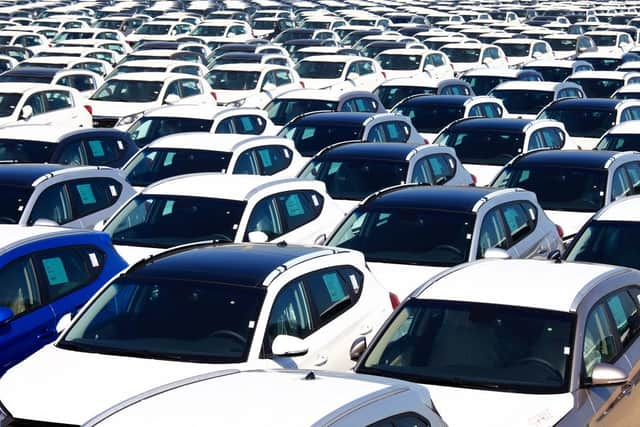July new car sales fall to 13-year low as pingdemic and chip shortage hits


New car registrations fell by almost 30 per cent last month, recording the worst July performance since 1998.
The Society of Motor Manufacturers and Traders (SMMT) said that there were issues on both supply and demand sides of sales as the effect of the so-called “pingdemic” combined with a component shortage.
Advertisement
Hide AdAdvertisement
Hide AdA total of 123,296 new cars were registered in July, a decline of 29.5 per cent compared with July 2020. The SMMT said that last July was an exceptional month as dealers reopened after lockdown but July 2021 remained 22 per cent down on the average for the last 10 years.


While overall registrations were down, electric and hybrid vehicles continued to perform well. Battery electric vehicle registrations were up 36.5 per cent on last July and plug-in hybrids and full hybrids were up 32 and 15 per cent respectively. However, petrol and diesel, which still account for three-quarters of registrations, were down around 45 and 69 per cent respectively.
SMMT chief executive Mike Hawes said that dealerships had been hit by large scale staff absences due to employees being ordered to isolate by Covid tracing apps. This has combined with a global shortage of semiconductors which is affecting all technological industries and holding up car production.
He warned that while staff shortages should ease in the short term, supply chain issues were likely to continue to throttle the market for months to come.
Advertisement
Hide AdAdvertisement
Hide AdHe said: “The automotive sector continues to battle against shortages of semiconductors and staff, which is throttling our ability to translate a strengthening economic outlook into a full recovery. The next few weeks will see changes to self-isolation policies which will hopefully help those companies across the industry dealing with staff absences, but the semiconductor shortage is likely to remain an issue until at least the rest of the year.”
Ian Plummer, commercial director of Auto Trader said the continued supply chain issues were bad news for the new car market but good news for used car sales. He commented: “The new car sector has been dealt a perfect storm of which the full impact on retail is only now being realised.
“However, it would be easy to misinterpret these results as a drop in consumer demand for new cars, but our data shows that that couldn’t be further from the truth. In fact, 1.4 million people viewed a new car on Auto Trader in July, which is up 6 per cent compared to last year’s post lockdown July sales burst and more than double 2019 levels.
“The potential lost sales make the supply constraints all the more frustrating for car brands and retailers. However, with three quarters of car buyers prepared to buy a used car if their brand-new choice wasn’t available, our research highlights the opportunity to convert new buyers to used.”
Advertisement
Hide AdAdvertisement
Hide AdHis view was echoed by others in the used car trade, including Alex Buttle of Motorway.co.uk. He said: “While there is potentially strong demand out there to buy a new car, many frustrated buyers are not willing to wait six to nine months, or even longer on some models, to take delivery of their new motor.
“The knock-on effect is that car owners are either choosing to hold onto their existing cars longer to ‘go electric’ later, or are looking at the used car market instead for current models they want. The used car market is booming not just because buyers are looking for value, but because of limited new car choice.”
Comment Guidelines
National World encourages reader discussion on our stories. User feedback, insights and back-and-forth exchanges add a rich layer of context to reporting. Please review our Community Guidelines before commenting.